
"Everyday People" is a 1968 song composed by Sly Stone and first recorded by his band, Sly and the Family Stone. It was the first single by the band to go to number one on the Soul singles chart and the U.S. Billboard Hot 100 chart. It held that position on the Hot 100 for four weeks, from February 9 to March 8, 1969, and is remembered as one of the most popular songs of the 1960s. Billboard ranked it as the No. 5 song of 1969.
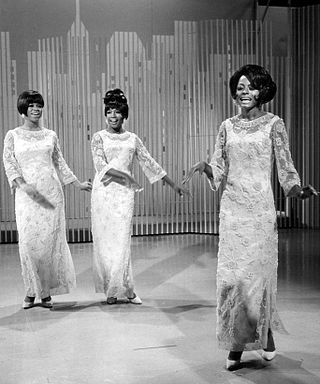
American girl group The Supremes have released 29 studio albums, four live albums, two soundtrack albums, 32 compilation albums, four box sets, 66 singles and three promotional singles. The Supremes are the most successful American group of all time, and the 26th greatest artist of all time on the US Billboard charts; with 12 number-one songs on the Billboard Hot 100 and three number-one albums on the Billboard 200. The Supremes were the first artist to accumulate five consecutive number-one singles on the US Hot 100 and the first female group to top the Billboard 200 albums chart with The Supremes A' Go-Go (1966). In 2017, Billboard ranked The Supremes as the number-one girl group of all time, publishing, 'although there have been many girl group smashes in the decades since the Supremes ruled the Billboard charts, no collective has yet to challenge their, for lack of a better word, supremacy.' In 2019, the UK Official Charts Company placed 7 Supremes songs—"You Can't Hurry Love" (16), "Baby Love" (23), "Stop! In the Name of Love" (56), "Where Did Our Love Go?" (59), "You Keep Me Hangin' On" (78), "Come See About Me" (94) and "Stoned Love" (99)—on The Official Top 100 Motown songs of the Millennium chart, which ranks Motown releases by their all-time UK downloads and streams.
The Foundations were a British soul band who were primarily active between 1967 and 1970. The group's background was: West Indian, White British and Sri Lankan. Their 1967 debut single "Baby Now That I've Found You" reached number one in the UK and Canada, and number eleven in the US. Their 1968 single "Build Me Up Buttercup" reached number two in the UK and number three on the US Billboard Hot 100. The group was the first multi-racial group to have a number one hit in the UK in the 1960s.
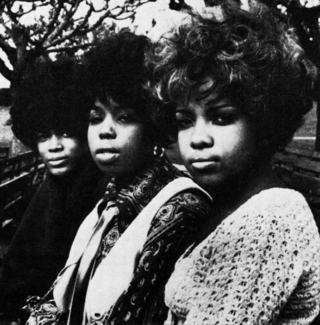
Little Sister was an American all-female vocal harmony group, which served primarily as the background vocalists for the influential rock/funk band Sly and the Family Stone in concert and on record. Originally a gospel music group called The Heavenly Tones, Little Sister was composed of Vet Stewart, Mary McCreary, and Elva Mouton, and became a recording act of its own for a brief period in 1970–1971.

"You're All I Need to Get By" is a song recorded by the American R&B/soul duo Marvin Gaye and Tammi Terrell and released on Motown Records' Tamla label in 1968. It was the basis for the 1995 single "I'll Be There for You/You're All I Need to Get By" from Method Man and Mary J. Blige.
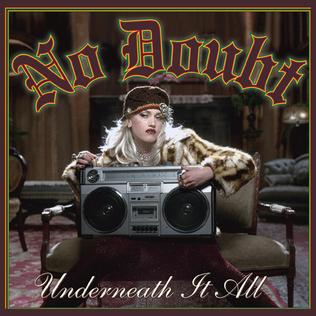
"Underneath It All" is a song by American ska band No Doubt from their fourth studio album Rock Steady (2001). It was written by the band's lead singer Gwen Stefani and David Stewart. The song features a reggae production from Sly and Robbie and guest vocals from Lady Saw. The song received mixed reviews from contemporary music critics.

Diana Ross is the seventh studio album by American singer Diana Ross, released on February 10, 1976 by Motown Records. It is her second self-titled record after her 1970 debut. It reached #5 in the USA and sold over 900,000 copies.

"Angel" is a song by Canadian singer-songwriter Sarah McLachlan. The song first appeared on McLachlan's fourth studio album, Surfacing, in 1997 and was released as the album's fourth and final single in September 1998. The lyrics are about the death of musician Jonathan Melvoin (1961–1996) from a heroin overdose, as McLachlan explained on VH1 Storytellers. It is sometimes mistitled as "In the Arms of an Angel". or "Arms of the Angel".

"Keep It Together" is a song by American singer Madonna from her fourth studio album, Like a Prayer (1989). It was released as the fifth and final single from the album in the United States, Canada and Japan on January 30, 1990, by Sire Records. Written and produced by Madonna and Stephen Bray, the main inspiration behind "Keep It Together" was Madonna's relationship with her family—whom she dearly missed during her divorce from Sean Penn. The song was dedicated to the American band Sly and the Family Stone. The lyrics deal with the realization of how important Madonna's family has been to her life. A pop, funk and deep funk song consisting of an upbeat rhythm and groove, "Keep It Together" features instrumentation from percussion, banjo and a conga.
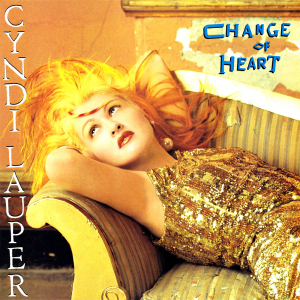
"Change of Heart" is a song by American singer and songwriter Cyndi Lauper, released on November 11, 1986 as the second single from her second album, True Colors (1986). It went gold in the US, peaking at No. 3 on the Billboard Hot 100. The song was written by singer-songwriter Essra Mohawk. Popular remixes by Shep Pettibone were also released. A music video was produced for the song, filmed in Trafalgar Square in London. It features Lauper and her tour band performing the song in front of a large group of people. The Bangles sang background vocals on the original recording. A live version of the song was released on Lauper's live album/DVD, To Memphis, with Love.

Stephen Stills is the debut solo album by American musician Stephen Stills released on Atlantic Records in 1970. It is one of four high-profile albums released by each member of Crosby, Stills, Nash & Young in the wake of their 1970 chart-topping album Déjà Vu, along with After the Gold Rush, If I Could Only Remember My Name and Songs for Beginners. It was primarily recorded between CSNY tours in London and Los Angeles. It was released in the United States on November 16, 1970, and in the United Kingdom on November 27, 1970.
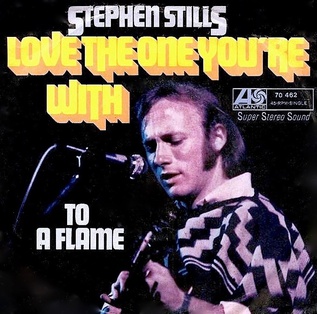
"Love the One You're With" is a song by American folk rock musician Stephen Stills. It was released as the lead single from his debut self-titled studio album in November 1970. The song, inspired by a remark Stills heard from musician Billy Preston, became his biggest hit single, peaking at No. 14 on the Billboard Hot 100 in early 1971. David Crosby and Graham Nash, Stills' fellow members of Crosby, Stills & Nash, provide background vocals on the song. Also providing the backups are Rita Coolidge, her sister Priscilla Jones, and John Sebastian. They all sing the "Do Dos" that come before the instrumental portion and the Outro. The song was also recorded by the Isley Brothers, The Meters, Bucks Fizz, Luther Vandross, Bob Seger and Richard Clapton, among others.
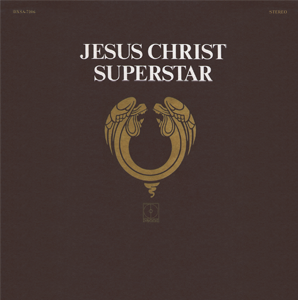
"Superstar" is the title song from the 1970 album and 1971 rock opera Jesus Christ Superstar written by Andrew Lloyd Webber and Tim Rice.
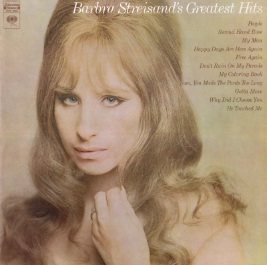
Barbra Streisand's Greatest Hits is the first greatest hits album recorded by American vocalist Barbra Streisand. It was released in January 1970, by Columbia Records. The record is a compilation consisting of 11 commercially successful singles from the singer's releases in the 1960s, with a majority of them being cover songs. The songs on Barbra Streisand's Greatest Hits originally appeared on one of the singer's eight previous albums and span in release from 1963 to 1968. It contains her most commercially successful tracks, including her first Billboard Hot 100 top ten single "People" and top 40 entry "Second Hand Rose". The album was distributed on compact disc in 1986 and rereleased under the title The Hits in 2006.
"Mercy, Mercy, Mercy" is a jazz song written by Joe Zawinul in 1966 for Cannonball Adderley and which appears on his album Mercy, Mercy, Mercy! Live at "The Club". The song is the title track of the album and became a surprise hit in February 1967. "Mercy, Mercy, Mercy" went to #2 on the Soul chart and #11 on the Billboard Hot 100 chart.
"The Tip of My Fingers", also titled "The Tips of My Fingers", is a song written and originally recorded by American country music singer Bill Anderson. First included on his 1962 album Bill Anderson Sings Country Heart Songs, the song was a Top Ten country single for him in 1960.

Sir Sly is an American indie rock band formed and based in Orange County, California, United States. The band is fronted by vocalist Landon Jacobs with instrumentalists Jason Suwito and Hayden Coplen accompanying him. The trio gradually built a steady following and managed to top The Hype Machine chart, eventually revealing their identities.
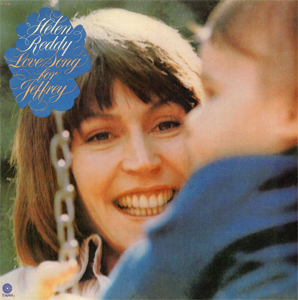
Love Song for Jeffrey is the fifth studio album by Australian-American pop singer Helen Reddy, released on March 25, 1974, by Capitol Records. The album focused on her family, giving special attention to those who had died within the past year. A tribute on the back cover reads: "In memory of my mother, Stella Lamond Reddy, July 1973, my father, Max Reddy, September 1973, and my beloved aunt, Helen Reddy Sr., January 1974."
"Life" is a song by Sly & the Family Stone. Released as a single from the album Life, it reached the lower regions of the Billboard Hot 100 in the US. It also charted on the RPM100 in Canada.
"Somebody's Watching You" was a single for Little Sister in 1970. It became a hit for the group and registered in the Billboard and Cash Box charts.













